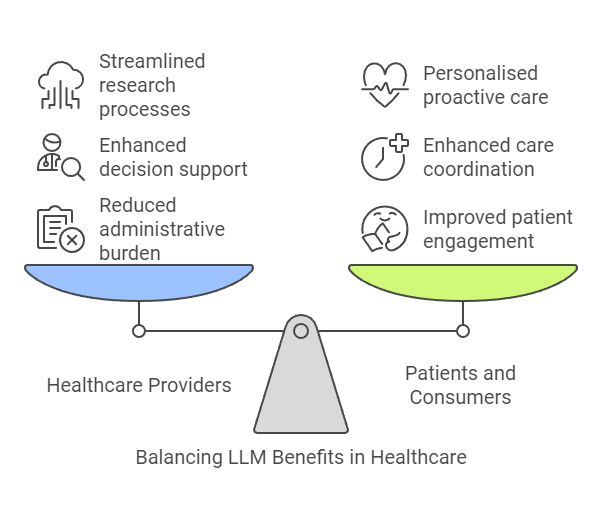How do LLMs transform healthcare delivery and patient experiences?

LLMs are poised to transform healthcare delivery and patient experiences in several ways.
For Healthcare Providers:
● Reduced administrative burden: LLMs can automate tasks like scheduling appointments, managing patient records, generating reports, and coding and billing, freeing up healthcare professionals to focus on patient care. For instance, HCA is using Google's LLM to automate patient handoffs and generate detailed reports for nurses.
● Enhanced clinical decision support: LLMs can provide clinicians with real-time insights by analysing vast amounts of medical literature, patient data, and clinical guidelines. This can lead to more precise diagnoses, personalised treatment plans, and improved patient outcomes.
● Streamlined research and development: LLMs can accelerate drug discovery by identifying potential drug targets and analysing complex research data. They can also help optimise clinical trials by automating documentation, recruiting patients, and analysing results.14
For Patients and Consumers:
● Improved patient engagement and education: LLM-powered chatbots and virtual assistants can provide 24/7 support, answer questions, explain medical jargon, and offer personalised health education. This can empower patients to take control of their health and make informed decisions.
● Enhanced care coordination and navigation: LLMs can assist patients in navigating the healthcare system by scheduling appointments, managing prescriptions, and connecting them with relevant resources. For example, health plan wizards can guide patients through their insurance plans and connect them with appropriate providers.
● Personalised and proactive care: LLMs can analyse patient data to identify potential health risks and provide tailored recommendations for preventive care. They can also monitor patients remotely and alert healthcare providers to any concerning changes.
Overall, LLMs offer a significant opportunity to enhance healthcare delivery and improve patient experiences.
By automating tasks, providing insights, and personalising care, LLMs can help create a more efficient, effective, and patient-centred healthcare system.
However, it's crucial to acknowledge the ethical considerations surrounding the use of LLMs in healthcare, including data privacy, algorithmic bias, and the potential for misuse. Addressing these challenges is essential to ensure that LLMs are used responsibly and for the benefit of all.
